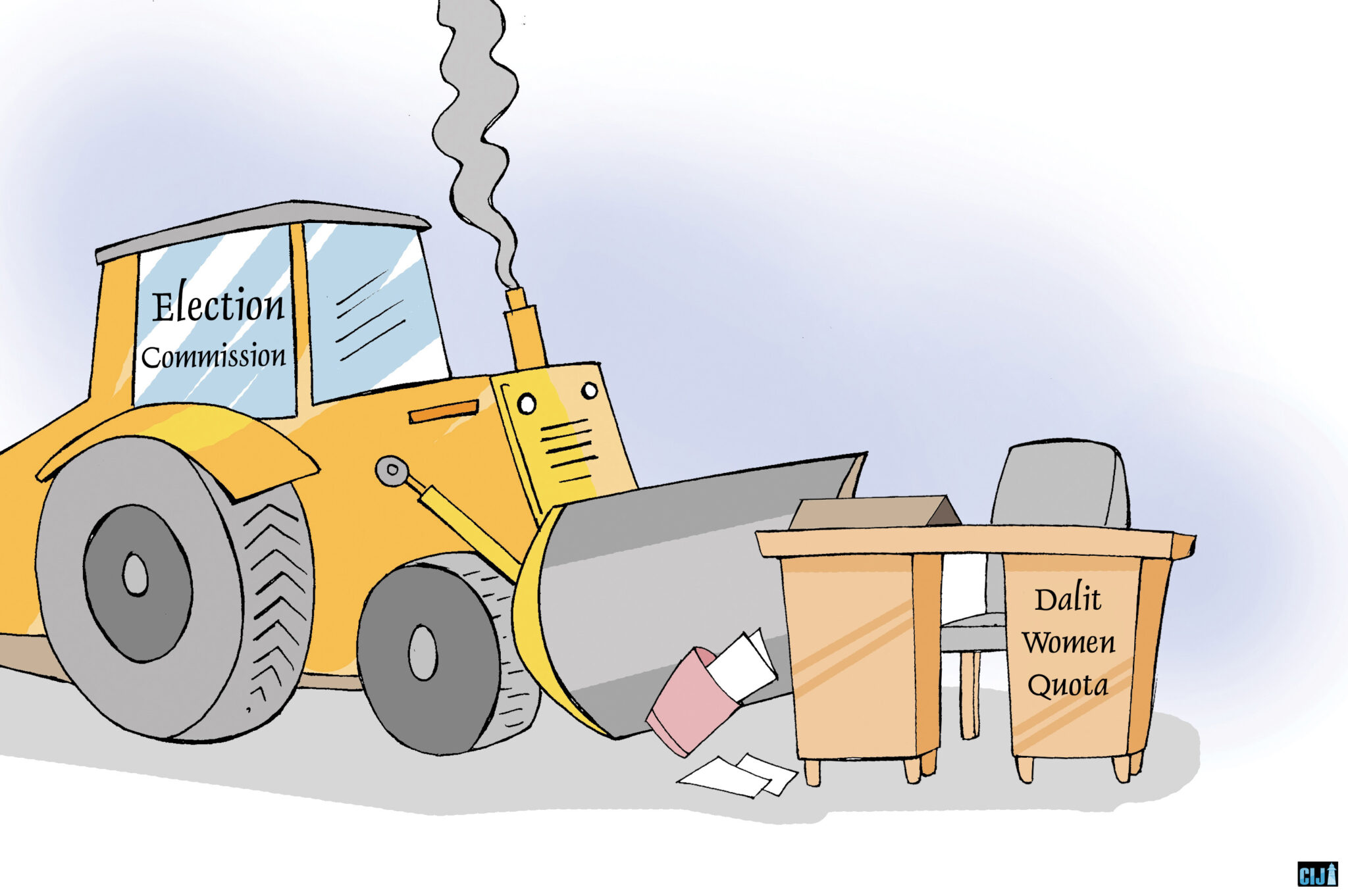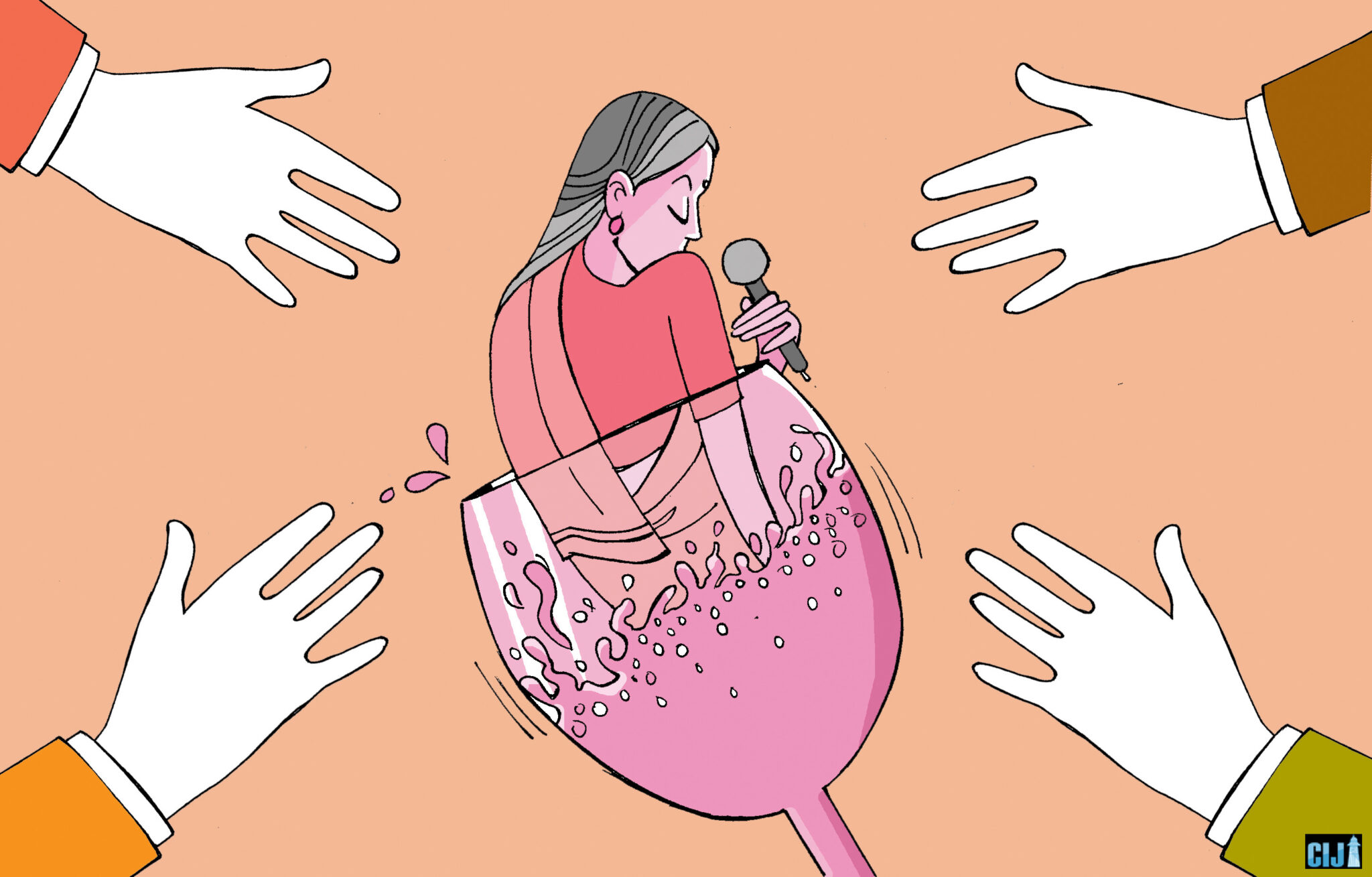Many countries around the world don’t have laws that criminalise marital rape, but Nepal has already enacted one, classifying forced physical relations within or outside of marriage as rape. Despite this, societal attitudes obstruct victims’ access to justice.
Pratima Silwal |CIJ, Nepal
Kalika had just fallen asleep after working on the field all day on March 12, 2022, when her inebriated husband returned home at midnight.
She couldn’t ignore her husband’s call as doing so in the past had resulted in physical violence. Kalika’s husband clung to her for a long time. “When I told him I couldn’t take it any longer, he accused me of sleeping with other men,” she recalls events from that night.
Now she wonders why the person who promised to love and support her for the rest of his life 20 years ago is treating her like an object, devoid of thought or feeling. How can someone who loved her subject her to more physical torment in order to gratify himself?, she wonders.
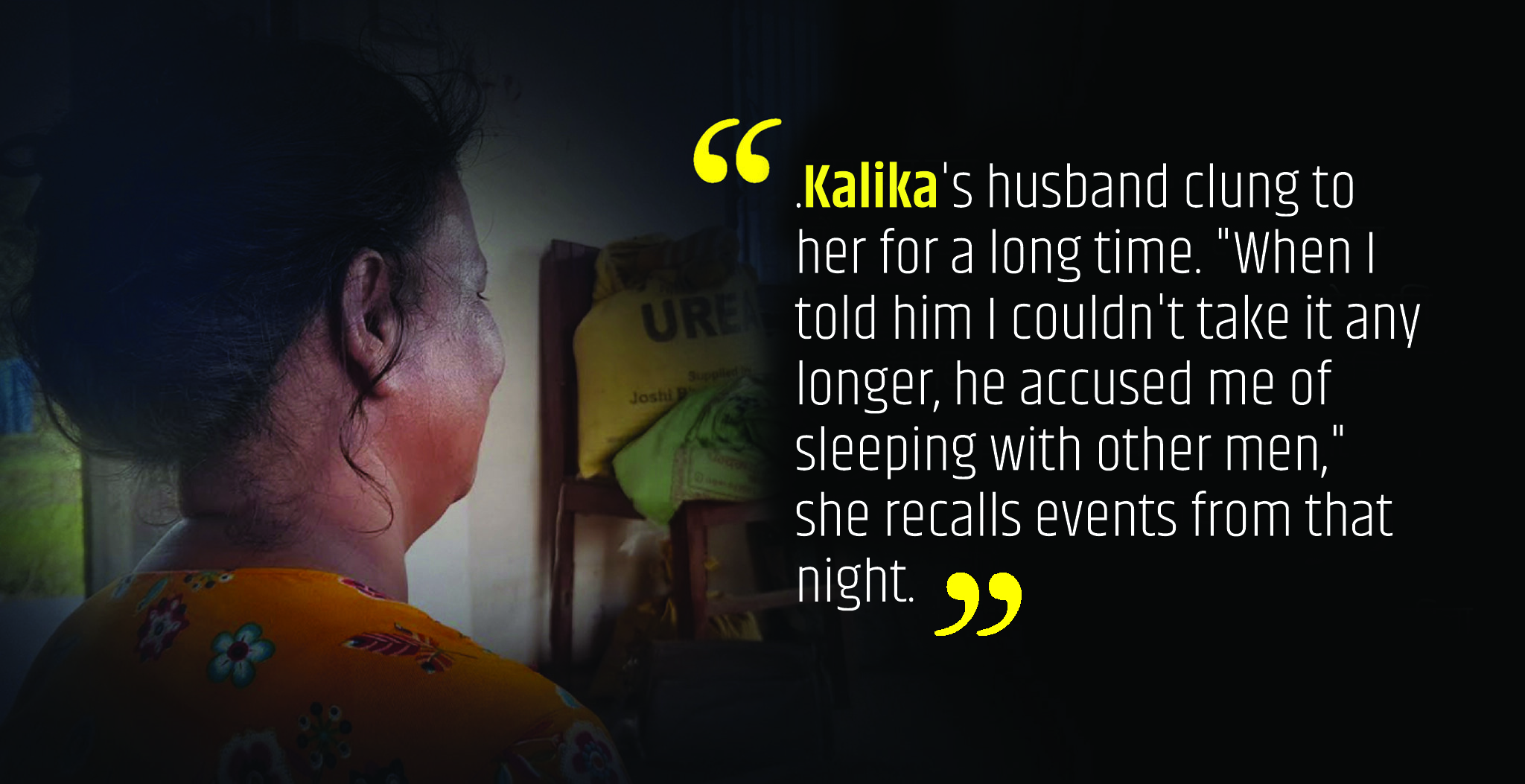
Kalika doesn’t have answers to the questions that keep popping into her head. The couple still lives together and shares the same kitchen. From the outside, everything appears to be normal. But Kalika’s pain is unbearable.
Her lover, who is younger than her, promised her 20 years that he would keep her happy. But he broke the promise only two years into the marriage. After marrying, they relocated to Rampur in West Chitwan from Kalika Municipality in the east of the district. Life went on as both worked as daily wage earners. “My condition worsened when we left Rampur,” she says.
“‘You are not attractive. I brought you to Madi to make you sad,” he used to say. “When he returned from abroad, he suspected I was cheating on him and tortured me.”
“On that day, I had bruises on my whole body,” Kalika remembers. “I somehow escaped.”
She had approached a local woman leader for assistance in filing a police complaint. The leader stopped her from doing so as it was already late at night.
The following day, March 29, she went to the police station to seek protection from her husband. Officials caught her husband and detained him for five days. However, they didn’t bother to even look into allegations of marital rape, let alone file a case.
The ward level reconciliation committee met at the police station to discuss the case. As her neighbours and family members advised her to forgive her husband one last time, police officials wanted her to do the same. Puran Mahato, ward chief of Madi-3, also signed the reconciliation document. Her husband was then released after agreeing not to beat her again.
“He was released after five days because he promised not to beat his wife again,” said Mahato. “I was present during the discussion, but I wasn’t there when he was released.”
Even after that, the atrocities and beatings continued. Kalika complained that she had some genital abnormalities. Instead of taking her to the hospital, he mocked her by accusing her of sleeping with someone else.
In the first week of January, Kalika’s husband traveled to Bharatpur for work. When he returned on January 15, he discovered a discarded condom in the pool of a pond about a kilometer away from the house. When he returned home, he beat his wife and asked, “Who are you sleeping with?”
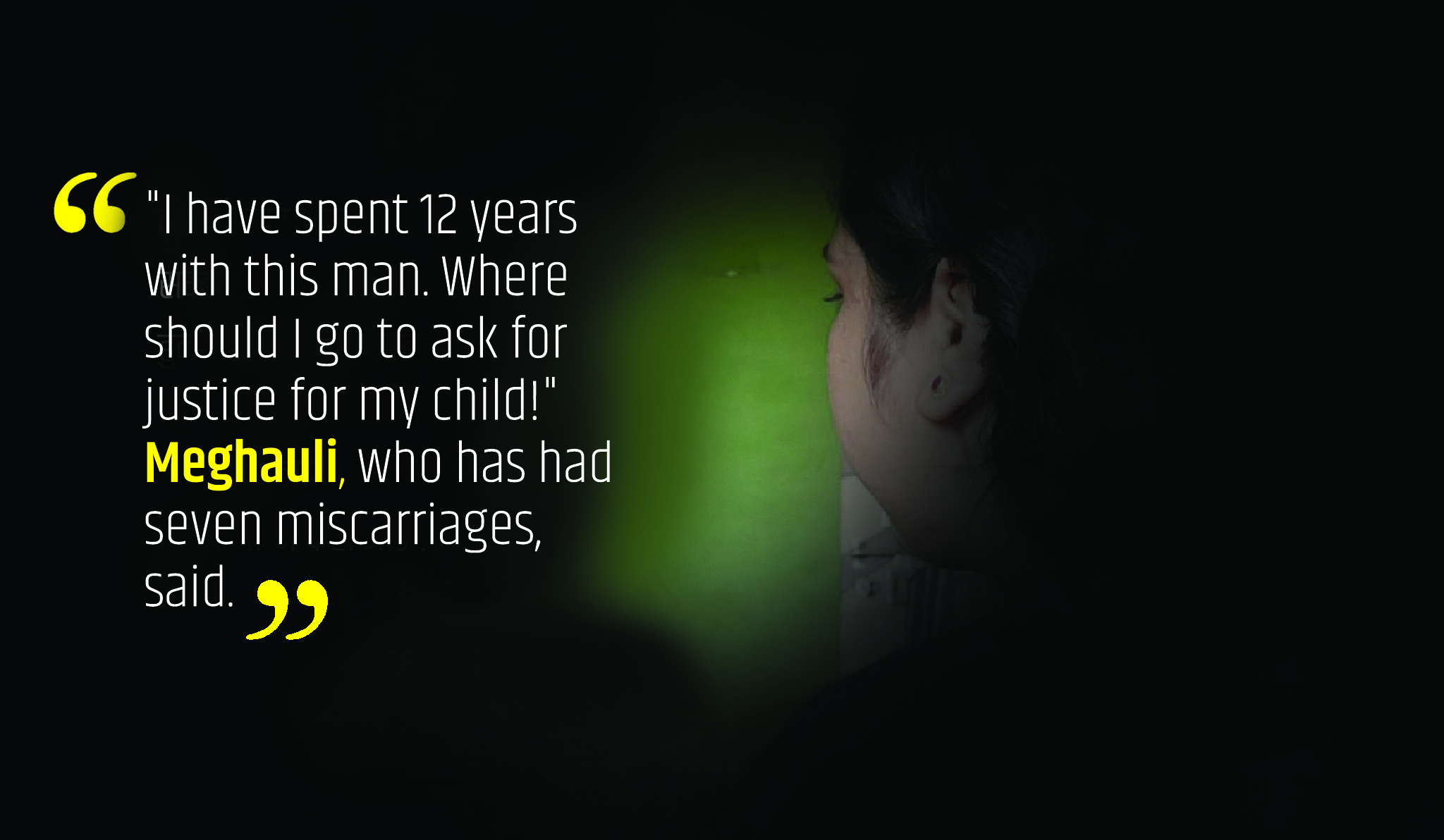
“We should have taken legal action,” Mahato says. “At the time, he agreed to improve, but the beatings and abuse haven’t stopped.”
Kalika claims Mahato advised her to file for divorce without bringing up the issue of marital rape. The documents related to the discussion and the subsequent reconciliation between the parties couldn’t be located at the police station. The incident was not even classified as “normal beatings” by the police.
Only four complaints of marital rape have been filed at the District Police Office in Chitwan since the Criminal Code went into effect on August 17, 2018.
“I had no idea that if my husband forced me to have sex, it was rape. I had no idea we could file a complaint against our husbands,” Kalika says. “I went door-to-door seeking help from political leaders and police pleading for justice, but no one told me a rape case should be filed.”
On May 2, 2002, the Supreme Court directed the government to enact legislation making marital rape a crime. Four years later, the law was completed.
Following the promulgation of the interim constitution in 2007, a bill to amend certain Nepal Acts was introduced to reform laws to ensure gender equality, which defined marital rape as a crime and provided for punishment.
The new criminal code, which came into effect on August 17, 2018, also states that if a husband rapes his wife, he faces up to five years in prison.
However, cases of marital rape have only been brought to court on a few occasions. According to the Attorney General’s annual report, there wasn’t a single case related to this in the Supreme Court for fiscal year 2020/21. Only in three of the ten cases heard in the High Court during that fiscal year the accused was convicted, while two were acquitted. Similarly, in 34 cases filed at the district courts, the accused was found guilty in four and acquitted in nine. There are currently 21 cases pending.
The story of another woman, Meghauli from Madi, offers clues tot the question as to why cases of marital rape reach the court so rarely.
Tale of terrible torture
The case of 32-year-old Meghauli from Madi, who has been raped by her husband for 12 years, demonstrates that, despite the law, there is a strong force within society and the home to not consider marital rape a crime.
Just like Kalika, Meghauli was prevented from taking legal action. At the ‘Bhadra Sabha’ (meeting of the community leaders) held on Oct 15, 2022, ti discuss her case, no one was concerned about the psychological effects of sexual violence on Meghauli .
Meghauli married on November 30, 2011 without the consent of her family and moved in with her husband and her 11-year-old son. Her husband, a driver, soon began abusing her.
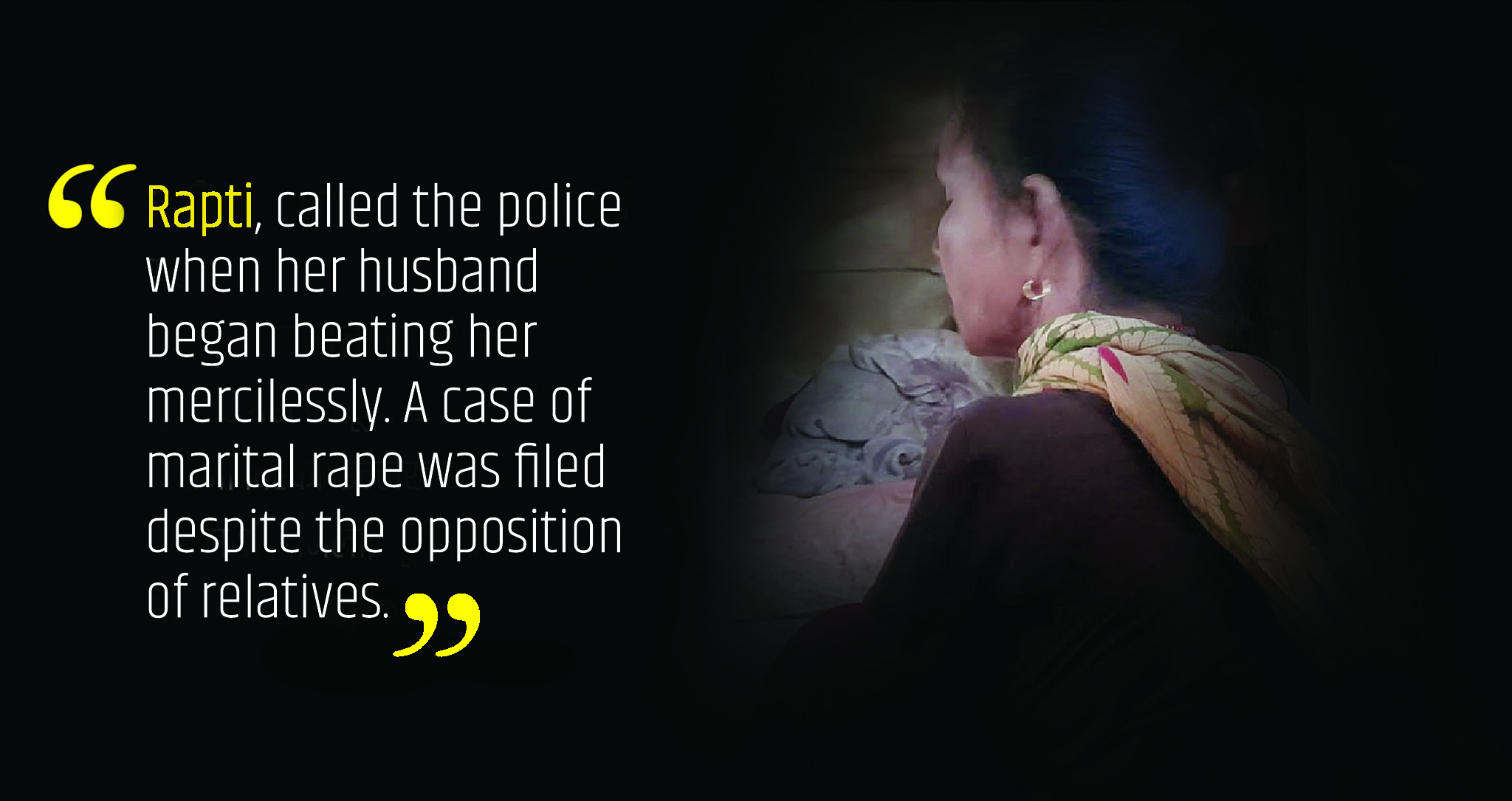
Meghauli filed a complaint with the local police station on September 30, 2022. But instead of taking action, the officials only discussed the issue surfacially. She told her husband’s relatives and the police at the time, “I treat all his relatives with respect, but I can’t sleep in the same bed with him.”
According to the law, if a case of marital rape is registered, the court can order the husband to allow the wife to live in the same house, treat her well and provide timely medical attention to her.
No one, however, advised Meghauli to seek justice by filing a case of marital rape. Instead, friends and family advised her to give him another chance. She would have nowhere to go with her son if her husband evicted her because she has no property of her own. As a result, she had no choice but to give her husband another chance.
“I have spent 12 years with this man. Where should I go to ask for justice for my child!” Meghauli, who has had seven miscarriages, said. ”
According to the District Police Office, Chitwan, 223 domestic violence complaints were filed till December of the current fiscal year. Out of them, 119 were resolved through reconciliation. Although Meghauli’s case was counted as an incident of domestic violence, police officials turned a blind eye to rape that she suffered every night from her husband.
Madi-6 Ward President Dipendra Poudel was also present when Meghauli filed a complaint at the local police office. “We saw that the husband was abusive, and had extra-marital affairs.”
“When we talked in private, she told us everything,” Paudel said, “I told her to file for divorce, but she said she would have nowhere to go.”
Paudel said that the case was closed after her husband agreed not to beat her again.
According to Police Inspector Santosh Khadka of the Area Police Office in Madi, he brought the woman and her husband in for questioning based on a verbal complaint that the woman’s husband abused her. He also stated that he signed the settlement agreement, which states that her husband will no longer abuse her. Khadka claimed that he was unaware of Kalika’s case because it occurred before he took office.
Rapti, who lives two kilometers away from Kalika’s home, called the police when her husband began beating her mercilessly. A case of marital rape was filed despite the opposition of relatives.
Rapti had discussed the issue with the Ward Office Reconciliation Committee after the beatings became more frequent, and each time her husband agreed not to beat her. However, the same incident occurred again on March 21, 2022.
Rapti then filed a complaint with the police for marital rape. Her husband has been placed in judicial custody pending an investigation by the court. When she returned home, however, she became the talk of the town, and her relatives and neighbours avoided her. “What kind of woman arrests her husband?” they had asked.
She struggled to earn a living for her son and herself as she had lost one of her hands as a child. Due to family and societal pressures, as well as extreme poverty, she changed her statement in court, claiming that she filed the complaint out of rage and her husband was innocent. On that basis, the court decided to acquit Rapti’s husband.
“She reported that she was beaten by her husband even after he returned from prison after six months,” says Shobhakaji Mahato, a human rights activist and the Madi municipality’s city-level reconciliation committee coordinator.
Marriage or license to rape?
The NGO Women’s Rehabilitation Center (WOREC) that maintains records of cases of violence against women reported in the media, states that greatest risk to women is inside the home.
The majority of the violence occurred inside the home, according to an analysis of 319 incidents, including 266 reported to the NGO and 53 reported in newspapers. The husband is responsible for approximately 56 percent of all violence. Only 0.31 percent of the total cases were reported as marital rape.
However, advocate Phoolmaya Ranabhat, who has been working for women’s rights in Chitwan for two decades, claims that at least 30 percent of women who report domestic violence are victims of marital rape.
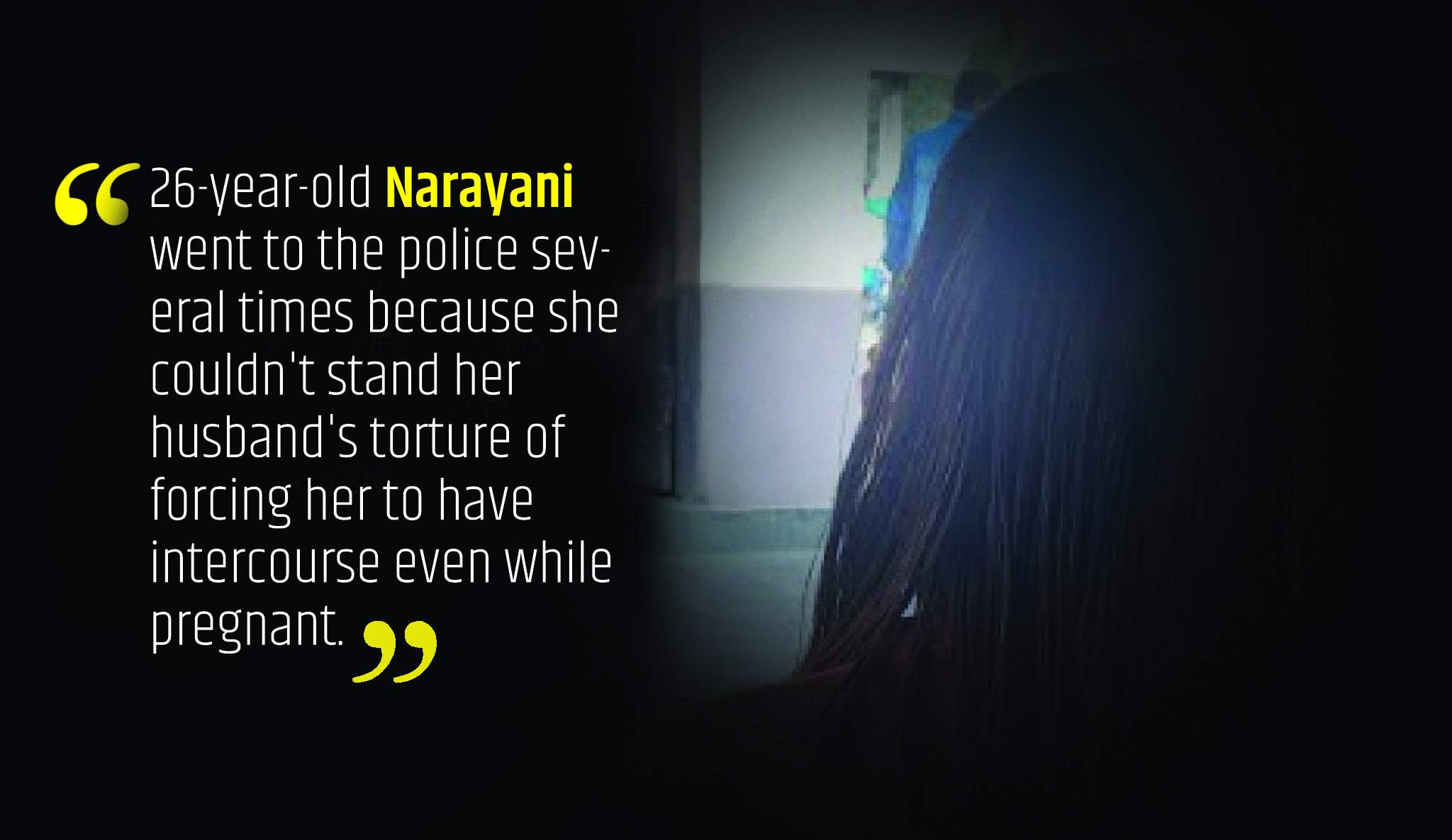
According to Ranabhat, “Women who have been raped by their husbands don’t want a divorce because of complicated court procedures and delays in justice. They don’t want to pursue the rape case.”
The abuse suffered by 26-year-old Narayani of Kalika Municipality exemplifies Ranabhat’s claim. She went to the police several times because she couldn’t stand her husband’s torture of forcing her to have intercourse even while pregnant. She initially concealed the fact that she had been sexually assaulted from the police and relatives, claiming that it was only a beating. Every time, a group of police officers and locals would gather and send the couple home, forcing the husband to promise not to beat her again.
She wondered how her own husband could continue to be cruel. They met while she was in eighth grade. Narayani decided to marry the man, a bus driver at the time, within a week of meeting him. “If only I had known the possibility of all these sorrows that could happen after marriage at the age of 13!” she thinks now.
She couldn’t fathom why the husband of her own choice was so cruel. All she had wanted was a home and a family and to bring up children. However, the sexual torture became unbearable.
After contacting the local police three times, she had no option but to approach the district police office, Chitwan as no one heard her complaints. As the case of marital rape couldn’t be registered, she looked for an alternative and decided to file for divorce on May 16, 2022.
According to psychologist Dr. Archana Pokharel, in our society, men believe they can do whatever they want with their wives from a young age. “Women suffer from various forms of domestic violence and rape after marriage because of such toxic’male sentiment,” she claims.
She said that studies have shown that such incidents cause women to suffer from insomnia, excessive anxiety, ad post-traumatic stress disorder.
“Women who have been sexually tortured have a fear of the incident flashing before their eyes like a movie screen,” she says.
As Dr. Pokharel sid, Meghauli, 32, had to take depression medication for seven months as a result of sexual torture. The headache is still present. She keeps wondering if her husband will notice.
Obstacles aplenty for justice seekers
Advocate Meera Dhungana has spent her entire legal career representing women as victims. Around seven women in their 50s came to her office one day in 2001 saying that their husbands had sexually abused them.
“You work for women’s rights. “We are suffering because of our own husband; can you give us justice?” they asked. Attorney Dhungana recalls, “Following that, we thoroughly researched rape law. There was no provision for marital rape in it. We filed an appeal with the Supreme Court to challenge it.”
Following that, the Supreme Court directed that a law be enacted that criminalises marital rape as well. The original law provided for punishing a wife for up to three years; this has now been increased to five years. Furthermore, the law provides special protection for survivors.
Shobha Sharma, a journalist, went to the Chitwan district police office in the first week of October to report a relative’s marital rape. “While the conversation was going on, a police inspector from the district police office laughed and said to another person, ‘If a case were to be filed [regarding marital rape], my wife could have registered 30 cases [against me]!”.
According to journalist Sharma, not only the police, but also legal professionals, take the case of marital rape lightly during legal proceedings.
“People ask is it rape even when they are married,” says Advocate Meera Dhungana, corroborating the experience of Advocate Ranabhat and Journalist Sharma.
She stated that as majority of police officers and lawyers are men, they are not sensitive to such issues and the social structure that traumatises survivors in cases of marital rape also doesn’t help.
The law grants equal property rights to daughters at birth, but this is not reflected in practice. In reality, women often go to live in their husband’s house after marriage and therefore lack property ownership, leaving them vulnerable if their husband abandons them. While homes are traditionally considered to be a place of safety, the current social structure has made them dangerous for women.
The names of the survivors mentioned in this report have been changed.

